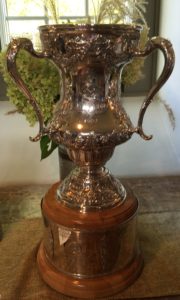Perseverance pays, along with perspective
February 10, 2017
Reaching the quarterfinal round of the U.S. Mid-Amateur means several things to the eight golfers who played the four matches.
Each of these players automatically qualify for the next year’s Mid-Am. Considering that over 4,000 golfers filed applications to play this year’s event, with 65 sectional qualifying tournaments, that exemption means a lot.

The trophy for the U.S. Mid-Amateur Championship
The Mid-Am winner also earns nine additional exemptions to future Mid-Ams, a two-year exemption to the U.S. Amateur, and an invitation to play in The Masters.
With those considerations, and the fact that reaching the quarterfinals means the golfers already played five competitive rounds in four days, the pressure builds.
At moments like this, a certain amount of perseverance really pays off. Nonetheless, it also helps to keep things in perspective.
Michael McDermott and Stewart Hagestad met for their quarterfinal match early in the morning Sept. 14. Hagestad, 25, made the Mid-Am in the first year he could have qualified, with six past U.S. Amateurs in his playing record. This was also the first time the 2013 USC grad qualified for match play in an USGA event.
McDermott had never before reached the quarterfinals in his prior USGA championships. This was uncharted territory for the member of the St. Joseph’s University Athletic Hall of Fame.
For the first three holes, McDermott showed great promise, quickly going three-up courtesy of two birdies by him and Hagestad’s blown chip shot bogey on the third hole.
The match turned Hagestad’s way on the fourth hole, however, with his routine, conceded par. McDermott hit a hard fade into the right rough, and butchered the ball from there for a double bogey.
Hagestad returned the favor on the fifth, driving into the creek short of the par-3 green for his own double. McDermott then drove deep left into trees on the 6th hole, dropped a ball near the hazard, and made another double.
He continued his troubles on No. 8, with a drive so far right that McDermott’s only option was to hit a pitch shot to 150 yards out. He made a nice bogey from there, but Hagestad cut his deficit to a single hole with his par.
Hagestad made the match all square on the 9th hole, despite his conceded bogey. McDermott’s swing continued to betray him, which lead to another double-bogey.
Both calmed down a bit thereafter, making pars on the next three holes. Hagestad then went one-up with another straightforward fairway-green-2-putt par, while McDermott’s troubles off the tee led to another bogey.
Hagestad remained one-up through the 17th hole, with both players matching several pars and a bogey. He then hit a center-fairway drive on the 18th to continue the pressure on McDermott, who hadn’t hit first off the tee for most of the round. At that point he made one of his best drives of the day, 10 yards past Hagestad.
With the hole tucked behind several front bunkers ringed with deep fescue, Hagestad’s second shot landed in the center of the green, 18 feet from the hole.
McDermott had to bring his second shot close for a birdie, but it landed short and deep into the fescue. As he walked by me, McDermott said quietly, “I picked the wrong club there.”
His chip finished 19 feet past the hole, and McDermott’s par putt finished two feet from the hole. At that point he conceded to a jubilant Hagestad, the eventual Mid-Am winner.
Hagestad said, “I’m really proud of the way I kind of stayed in the moment and grinded. Mike’s obviously a great player in the area, and I knew he was going to be a lot to handle.”
Reminded he was three down after three holes, Hagestad described his thoughts at that point: “I don’t want this to come off the wrong way, but I figured if I just played my own game and did what I was capable of and hit fairways and greens that you could get yourself right back in it.”
“Match play is so much about momentum,” he continued. “Little things like hitting first off the tee, putting a ball on the fairway. Even it’s a little bit of pressure, everyone feels it. I just kind of figured that if you play your own game and kind of kept plugging away and take it one hole at a time. So I’m happy with the way I really grinded back.”
McDermott said despite the loss, he was still excited about his performance: “I’ve never stared down a couple more wins away from going to the Masters and things like that. I’ll take a lot of positives from it. It’s hard to compare a good showing to a win, but this certainly ranks up there with a great experience, and in my hometown to do it like this is special.”
He was asked if their relative age difference played any part in the result, given that McDermott is 41 and Hagestad is 25. “I don’t think stamina wise it does. I think—when you’re 25, you’re fearless. I went home to kids each of the last two nights and shot baskets and put kids to bed. But no, I don’t think so. I think I had a real good chance to win this match. He executed better than me, and he should have won. I didn’t deserve to win today, even though I had a lead.”
McDermott also described the benefits of family life while playing at this level. “They were excited, and my oldest knows what Augusta and the Masters are and all that stuff. So we had talked about that. But when I come home tonight and I tell them I lost, they’re going to say, come on, let’s go play basketball. So they’ll forget about it quick and hopefully that’ll help me do the same.”
That is a very good perspective on sport, and on family.

